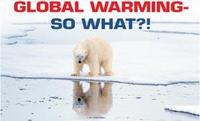Global Warming—So What!?
With the abundant information available to the mass public today, everyone knows about global warming and climate change. But as it turns out, knowing and caring do not always go hand in hand
There are university departments devoted to the issue of climate change, including Climatology and Environmental Studies. Activist groups worldwide are working to raise people’s awareness of the global climate trends; news on television and the Internet shows viewers satellite pictures of changes in ocean temperatures and melting glaciers; there is an abundance of scientific manuscripts, newspaper articles, and congressional hearings devoted to the issue.
Even pop culture has joined the campaign, as evidenced by the documentary, An Inconvenient Truth, about Al Gore’s activist work, and the children’s animation film, Ice Age: The Meltdown, about three cute and furry animals trying to survive the breakdown of a glacial dam. Hollywood stars like Leonardo DiCaprio are spokespersons for environmental awareness. DiCaprio has already appeared on the cover of Vanity Fair paired with a baby polar bear on a broken glacier in southeast Iceland; he’s spoken about it on Oprah, and warns in his film, The 11th Hour, that “human beings face extinction as a result of the environmental crisis.”
Other celebrities jumping on the bandwagon are Charlize Theron, Natalie Portman, Tom Hanks, Susan Sarandon and Salma Hayek—just to name a few.
The Result of Being Informed
The news is becoming more dramatic by the day. Before our eyes, we can see Antarctic ice shelves collapsing and falling into the ocean, and can witness disastrous hurricanes striking the coastlines of America.
There is no debate between scientists about the existence of global warming, neither about its causes nor its potential consequences. An article in Science Magazine stated that out of 928 published papers on climate change, none disagreed with the fact that human activity is changing the climate.
But more than all this, what’s truly disturbing is the fact that the more we know about global warming and the threats it poses—the less we seem to care! A recent survey of 1100 Americans, conducted by scientists from the Texas A&M University, showed that “The more informed one is about global warming, the less one feels personally responsible for this problem and the less one is concerned for global warming” (Risk Analysis, Vol.28, Issue 1, Feb 08). In total contradiction to what we would expect, research shows that the more actively the media publicizes the problem, and the more informed we are, the less concerned about it we become!
The Antidote to Indifference
Perhaps our indifference can be attributed to the fact that no one has been able to offer any viable solutions for the impending disaster, or maybe it’s because we feel too overwhelmed by the overabundance of disturbing facts. Hence we choose to simply push the problem aside, for the time being. But clearly we cannot ignore it when it begins affecting us personally—for example, when you happen to be that person in New Orleans whose entire family is wiped out by Hurricane Katrina. Because of the global nature of the problem, any one of us can be next—so why don’t we care?!
Kabbalah explains it very simply: What’s preventing us from thinking soberly and effectively about the problem is our cunning, narrow egoistic perception. It blinds us from seeing the broader perspective, from being able to evaluate the full gravity of the situation. Moreover, our ego blinds us to the fact that we are causing this to ourselves, and are therefore able to prevent it!
The fact is, we don’t have to tread “the path of suffering”—as Kabbalah calls it. If we develop a perception of bestowal—an altruistic perception, perception of the connections between us and of the bigger picture of reality, we will put an end to our growing imbalance with Nature and correct our actions in line with what Nature desires from us.
Therefore, to change the menacing trend of climate change and global warming, we must first change our indifference to them. That is why it is essential to spread the method of Kabbalah throughout the world—the means to develop a perception that will make us care, and enable us to truly affect change.
